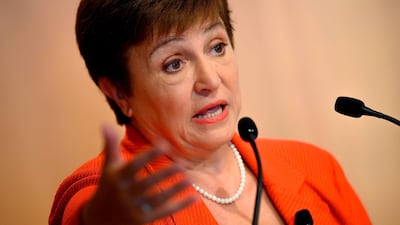The global economy is facing “a crisis like no other”, with great uncertainty about the extent and duration of the predicament caused by the Covid-19 pandemic, which requires a four-point recovery plan, the head of the International Monetary Fund said.
“Covid-19 has disrupted our social and economic order at lightning speed and on a scale that we have not seen in living memory,” Kristalina Georgieva said in a speech from Washington on Thursday before the organisation's annual spring gathering, which will be held online this month.
“The virus is causing tragic loss of life, and the lockdown needed to fight it has affected billions of people. What was normal just a few weeks ago going to school, going to work, being with family and friends — is now a huge risk,” she said.
Ms Georgieva is forecasting an “exceptionally difficult” year for the global economy in 2020, with growth likely to be more severely hit than during the 2008 global financial crisis.
"Global growth will turn sharply negative in 2020. In fact, we anticipate the worst economic fallout since the Great Depression," she said.
The IMF, which meets every three months and provides an updated forecast on the global economy, had projected positive per capita income growth in more than 160 of its 189 member countries in 2020.
"Today, that number has been turned on its head: we now project that over 170 countries will experience negative per capita income growth this year," Ms Georgieva said.
If the pandemic recedes in the second half of the year, if containment measures are lifted and the economy stabilises, the IMF's baseline assumption is for a partial recovery in 2021, she added.
"But again, I stress there is tremendous uncertainty around the outlook: it could get worse depending on many variable factors, including the duration of the pandemic.”
The first of the four points on the IMF’s recovery plan was to continue with essential containment measures and support for health services.
Protecting affected companies and individuals with “large, timely, targeted” fiscal and monetary measures was next. Reducing stress on the financial system to avoid contagion was third, and last was to plan for recovery to minimise the potential scarring effects of the crisis.
Ms Georgieva praised the global response so far, stating that an IMF Fiscal Monitor report due to be published next week will show that governments globally have embarked upon stimulus measures amounting to about $8 trillion (Dh29tn).
“In addition, there have been massive monetary measures from the G20 and others,” she said.
Ms Georgieva added, however, that the crisis was hitting the most vulnerable countries hardest, with outflows from emerging markets reaching $100 billion over the past two months – “more than three times larger than for the same period of the global financial crisis”.
The IMF has made $1tn in lending capacity available to countries and has doubled access to emergency facilities to $100bn.
“Lending programmes have already been approved at record speed — including for the Kyrgyz Republic, Rwanda, Madagascar, and Togo—with many more to come,” she said.
The IMF was also working with donors and the World Bank on debt relief for low-income countries and has called for standstill agreements to be put in place on bilateral loans to the world’s poorest countries.
“We don’t know yet how our economies and way of life will change, but we do know we will come out of this crisis more resilient,” Ms Georgieva said.


